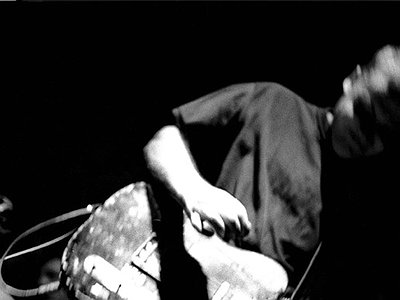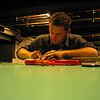When did you start playing your instrument, and what or who were your early passions or influences?
I began playing guitar in my bedroom. When I was about 17... learning chords from a 'tune a day' book and playing along with records. My mother gave me her classical guitar because she was about to become an acupuncturist and sensitive finger tips are needed for reading pulses and guitar playing is a no-no. My first influences were the giant rock bands like Led Zeppelin and Jimi Hendrix and later I discovered Gang of Four, Sonic youth, The Fall and a lot of African music and this became a much stronger influence on my playing once I started playing 'live". But the biggest influences have come from other musicians I have played with, particularly Dog Faced Hermans, The Ex, Kletka Red, and many individual musicians with whom I have collaborated.
What do you personally consider to be the incisive moments in your artistic work and/or career?
Forming the band Volunteer Slavery & Dog Faced Hermans in Edinburgh in 1986 and in 1988 seeing The Ex live for the first time in a pub in Sheffield in 1988 and joining the Ex in 1990.
Playing with Tom Cora and The Ex was also a great shifting moment for all of us. Equally when we started a project with Ethiopian saxophonist Getachew Mekuria. Hearing and seeing Big Flame, Sonic Youth, Don Cherry, Art Ensemble of Chicago, the Birthday Party, Han Bennink, Konono No 1, DJ Rupture, John Butcher, Anne-James, Chaton. All of these concerts changed me fundamentally - on a musical level anyway. Discovering Ethiopian, Ugandan and Algerian music and Rebetika from Greece were also big moments in my musical life and working with Yannis Kyriakides was a big change in direction for me.
Keith Rowe once asserted that it is often certain people that "give one permission to do things". How was that for you - in which way did the work of particular artists before you "allow" you to take decisions which were vital for your creative development?
I watched Terrie (The Ex) once, standing very still and play the simplest one note riff but with such intense feeling and commitment and belief in what he was doing that it inspired me and gave me a lot of courage. Ideas are important but your commitment and way of communicating and delivering those ideas are also vital. Colin from Dog Faced Hermans opened my ears up to a world of music I didn't really know or allow myself to explore, including 'jazz' which till then I'd considered to be old man's music. Yannis gave me the courage to leave space in my sound and work in a more dynamic way. He has such a strange sense of time and rhythm and it opened a lot of doors for me.
What are currently your main artistic challenges?
In the Ex I'm trying to learn how to play the baritone guitar using it as both a bass instrument and a chord instrument. It's a big challenge and I have a long way to go, but I love the sound. It's always a challenge with The Ex because we don't have a formula. We create new songs using a combination of collective improvisation and collective arrangement. Working collectively is always a challenge. Working with Yannis Kyriakides, Colin Mclean and Anne-James is also a big challenge as I am working with primarily electronic sounds (especially with Yannis and Colin) and trying to find a way to fuse my analogue electric guitar sound with these incredible sounds they produce. With Chaton it's more of an adventure because I'm working with someone who does not see himself at all as a musician ... though I hear many musical aspects in his poetry.
What do improvisation and composition mean to you and what, to you, are their respective merits?
Improvisation is the creative source of 90 per cent of my music so it means a lot to me. When we began making songs in Dog Faced Hermans or The Ex, they grew out of improvisation and responding intuitively to each other's ideas. This approach has not changed in the 27 years I have been playing. The difference now is that I also dare to improvise freely onstage during a concert. This began in the mid 90s when I started doing duo concerts with Terrie. Our concerts lasted 15 minutes but that seemed long enough at the time. Composition for me is simply a way of organising musical ideas in a form that gives it more form and shape. In some ways it's a form of control of our intuition and senses and a way of presenting our music in what we believe to be a more powerful, effective and listenable package.
We work a lot with building and releasing tension and dynamics, of course these can occur in free improvisation but we have less control of their shape and duration which is the exhilarating and exciting aspect of free improvisation. It's a kind of composition that we only partly control. I feel very lucky that I work in both ways; completely free improvisation with Lean Left, John Butcher, Christine Abdelnour and Colin Mclean and more structured work with The Ex and Yannis Kyriakides, Anne-James Chaton.
How important are practising and instrumental technique for achieving your musical goals?
Rehearsing is important. Keeping your skills up to a certain standard is necessary but I don't rehearse alone very often. With The Ex we rehearse for concentrated periods of 2-3 months, 3 times a week to build a new set. Then we have occasional rehearsals to fine tune songs or jog our memory banks before a tour. Nothing is written down so we need to remember by playing. Muscle memory plays a part in it, I don't find it so necessary to rehearse with musicians that I improvise with.
On several occasions when I have rehearsed with a musician before improvising we often played our best music during the rehearsal and the concert felt a bit flat. For me, part of the joy of improvising is the excitement that we experience from the fresh sounds we make the first moment we play together after a long time and this can really colour the direction and character of the whole concert.
One of the best situations for me is if I have just done a tour with The Ex and I play an improvised concert a few days later. I'm suddenly in a completely different musical environment but with my tools recently sharpened having played several concerts in a row just beforehand. Instrumental technique is important but virtuoso playing I find uninteresting Of course we need to be in good shape when we play but I don't believe in obsessive practicing. Our limitations can also give us great musical ideas. Many accidents happen and I like to let them happen and see where that takes me. As I mentioned earlier, intention, commitment and delivery are as important as technical skill and I think it's wise to develop both and be aware of both at any moment.
How do you see the relationship between sound, space and performance?
They are all extremely important, each one effecting the other. Awareness of the acoustic space, especially during free improvisation, is vital. I particularly like how John Butcher approaches this. He is hyper-aware of the resonant frequencies in the room and works with them in relation to his own sound but also to the other musicians he is playing with. When I improvise I focus a lot on sound. Sometimes I try to blend a sound or create a texture with another other musician and I am thinking more in terms of rhythm or frequencies than notes or chords or melodies. To me, this is all musical and of course performance is vital, how one's body moves and relates to the music is very telling and revealing. I don't feel I need to act in anyway on stage but I am very aware of the audience and the fact that they are watching as well as listening.
Derek Bailey defined improvising as the search for material which is endlessly transformable. Regardless of whether or not you agree with his perspective, what kind of materials have turned to be particularly transformable and stimulating for you?
I interpret his words as meaning that we search for sounds and ideas that lead us into a creative open space rather than into a dark corner with no way out. When I improvise it feels to me like the most intense vibrant moment of concentration I can ever experience. It is a rare thing to have total awareness and spontaneity in the present. It involves many tasks at the same time; listening, creating ideas, responding, initiating, actually transforming ideas into sounds and music and assessing what you have just done while preparing for what comes next. The mind, ears and fingers are all working at full tilt, there are not many moments in life when you can apply all these qualities at once.



